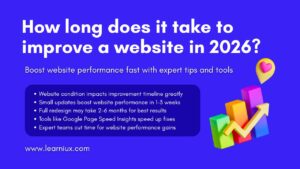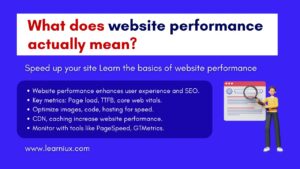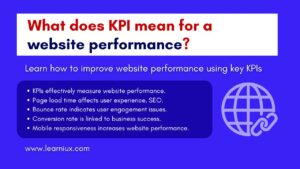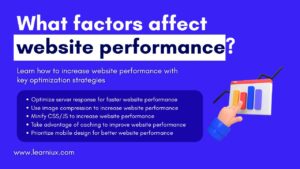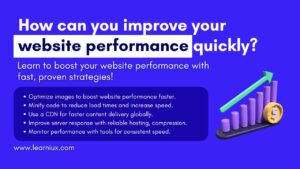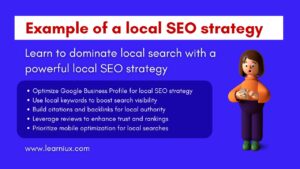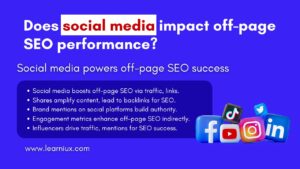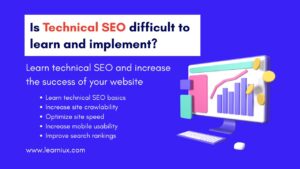Off-page SEO encompasses all the strategies and actions taken externally to improve a website’s search engine rankings. Unlike on-page SEO, which focuses on optimizing elements within a site such as content, keywords, and technical structure, off-page SEO builds a website’s authority, credibility, and relevance through external efforts. These efforts signal to search engines like Google that a website is trustworthy and valuable, which can significantly increase its visibility in search results. Of the various off-page SEO techniques, link building stands out as the most common and effective example. This comprehensive guide explores in detail link building, its importance, practical implementation strategies, complementary off-page SEO practices, common mistakes to avoid, and ways to measure success, as well as incorporating the keyword “off-page SEO” to ensure search engine optimization.
Understanding the Importance of Off-Page SEO
Off-page SEO is extremely important because it helps search engines assess a website’s reputation beyond its internal content. When other websites link to or mention your site, it acts as a vote of confidence, indicating that your content is trustworthy and relevant. This external validation can improve your website’s ranking on search engine results pages (SERPs), leading to more organic traffic. Off-page SEO also increases brand visibility, builds trust with your audience, and establishes your website as an authority in its niche. Link building, a primary example of off-page SEO, plays a key role in achieving these results by connecting your site to other trusted sources on the web.
Link building isn’t just about getting links; it’s about building relationships and creating a network of endorsements that increase your site’s credibility. Beyond link building, off-page SEO includes strategies such as social media engagement, influencer collaborations, and brand mentions, all of which contribute to a website’s digital footprint. By focusing on off-page SEO, businesses can differentiate themselves in competitive markets, attract high-quality traffic, and build a sustainable online presence.
What is link building in off-page SEO?
Link building refers to the process of acquiring backlinks to your own website from external websites. A backlink is a hyperlink from another site that directs users to a page on your website. Search engines like Google consider backlinks as an endorsement, where each link indicates that your content is valuable and worth referencing. The quality, quantity, and relevance of backlinks directly affect a website’s authority and ranking potential in off-page SEO.
High-quality backlinks come from reputable, authoritative websites, preferably in the same industry or niche as your site. For example, a backlink from a well-known industry blog carries more weight than an unrelated or low-quality site. A strategic approach to link building is necessary so that the links you acquire enhance your site’s credibility, rather than damage it. Effective link building not only improves search rankings but also increases referral traffic, exposes your brand to new audiences, and strengthens your online reputation.
Backlinks can be categorized into several types, each contributing to off-page SEO in different ways. Natural backlinks occur organically when other websites link to your content because they find it valuable. Guest post backlinks are earned by contributing articles to other websites that link back to your site. Editorial backlinks come from high-authority sources such as news outlets or industry publications that reference your content. Social media and forum backlinks, while less effective, can still drive traffic and contribute to your off-page SEO efforts.
Strategies for Effective Link Building in Off-Page SEO
Building high-quality backlinks requires a well-thought-out strategy that prioritizes value, relevance, and authenticity. Below are actionable methods for implementing link building as part of your off-page SEO efforts.
Create high-quality, shareable content
The cornerstone of successful link building is exceptional content that naturally attracts links. Content like in-depth guides, original research, infographics, case studies, or interactive tools are more likely to be referenced by other websites. For example, an extensive report on industry trends or unique data visualizations can entice bloggers, journalists, or industry leaders to link to your site. To increase shareability, make sure your content is well-researched, visually appealing, and addresses the needs or interests of your target audience.
When creating content, focus on topics that align with your niche. For example, if you run a fitness website, a detailed guide on “The Science Behind Effective Workout Routines” could attract backlinks from fitness blogs, health magazines, or even gyms. Include data, statistics, or expert insights to make your content a go-to resource, which increases the chances of it being linked to naturally as part of off-page SEO.
Reach out to relevant websites
Proactive outreach is a powerful way to secure backlinks for off-page SEO. Identify websites, blogs, or publications in your industry that match your content. Use tools like Ahrefs, Moz, or SEMrush to find sites with high domain authority and relevance to your niche. Once you’ve built a list, reach out to website owners, editors, or bloggers with a personalized email. Highlight why your content is valuable to their audience and suggest they include a link to your site.
For example, if you’ve published an in-depth article on sustainable fashion, reach out to eco-conscious blogs or magazines and offer to contribute a guest post or suggest linking to your article. Personalization is key—generic outreach emails often go unnoticed. Explain how your content complements their existing articles or adds value to their readers. Building relationships through outreach can lead to long-term partnerships, which can further enhance your off-page SEO efforts.
Guest Posting for Off-Page SEO
Guest posting is a popular link-building tactic in off-page SEO. It involves writing articles for other websites in your industry and including a backlink to your site in the content or author bio. Choose reputable websites with an engaged audience and strong domain authority. When guest posting, focus on delivering high-quality, informative content that matches the host site’s audience. This not only secures backlinks, but also positions you as an expert in your field.
To make guest posting effective, study the content guidelines of the target website and the preferences of the audience. For example, if you are targeting a tech blog, write about emerging technology or software trends and include a relevant link to a related article on your site. Avoid over-optimizing anchor text with exact-match keywords, as this can look unnatural to search engines. Instead, use branded or contextual anchor text to maintain authenticity in your off-page SEO strategy.
Leverage social media for off-page SEO
Social media platforms are valuable tools for amplifying your content and attracting backlinks. By sharing your content on platforms like LinkedIn, Twitter, or Reddit, you increase its visibility and encourage others to link to it. Interact with relevant communities, join discussions, and share your expertise to build connections that lead to backlinks. For example, participating in a Reddit thread about digital marketing and sharing a link to your in-depth SEO guide can drive traffic and attract links from interested users.
Social media also increases brand awareness, which indirectly supports off-page SEO. The more people see and share your content, the more likely you are to get natural backlinks. Create shareable posts like infographics or short videos to make it easy for users to spread your content to their networks.
Use online directories and citations
Submitting your website to reputable online directories or local business listings is another effective off-page SEO strategy. Directories like Yelp, Yellow Pages, or industry-specific platforms can provide valuable backlinks, especially for local businesses. Make sure the directories are trustworthy and relevant to your niche to avoid penalties from search engines. For example, a restaurant should focus on food-related directories, while a tech startup might target directories for software companies.
Citations that mention your business name, address, and phone number (NAP) also contribute to off-page SEO. Consistent NAP information in directories strengthens your local SEO and builds trust with search engines. Audit your citations regularly to ensure accuracy and relevance.
Complementary Off-Page SEO Strategies
While link building is the most common example of off-page SEO, other strategies can complement your efforts and further increase your website’s authority.
Social Media Marketing
An active social media presence goes beyond sharing content. Interacting with followers, responding to comments, and participating in industry conversations can increase your brand’s visibility. A strong social media presence signals to search engines that your brand is active and relevant, indirectly supporting your off-page SEO goals. For example, a viral social media campaign can increase website traffic and potentially lead to backlinks from users searching for your content.
Influencer Collaborations
Partnering with influencers in your industry can boost your off-page SEO efforts. Influencers with large, engaged audiences can share your content, mention your brand, or link to your website, driving traffic and building credibility. For example, a beauty brand that collaborates with a popular skincare influencer can get backlinks from the influencer’s blog or social media posts. To maximize impact, choose influencers whose audiences align with your target market.
Brand Mentions
Unlinked brand mentions occur when your website or brand is mentioned online without a hyperlink. These mentions contribute to off-page SEO by increasing brand awareness and showing relevance to search engines. Use tools like Google Alerts or Mentions to track brand mentions and reach out to website owners to request links. For example, if a blog mentions your product in an article, politely ask the author to include a link to your website for more context.
Online Reviews and Reputation Management
Online reviews on platforms like Google My Business, Trustpilot, or industry-specific sites can influence off-page SEO. Positive reviews increase your brand’s credibility and encourage other websites to reference or link to you. Encourage satisfied customers to leave reviews and respond professionally to feedback to build trust. A strong online reputation can lead to more organic mentions and backlinks, further supporting your off-page SEO strategy.
Common Off-Page SEO Mistakes to Avoid
Off-page SEO can undermine your efforts or lead to search engine penalties.
Getting Low-Quality Backlinks
Not all backlinks are beneficial. Links from spammy, irrelevant, or low-authority websites can hurt your rankings. For example, buying backlinks from link farms or using automated tools to generate links violates search engine guidelines and can lead to penalties. Always prioritize quality over quantity, focusing on backlinks from reputable sources in your industry.
Over-optimizing Anchor Text
Using the same keyword-rich anchor text for all backlinks can seem manipulative to search engines. Instead, diversify your anchor text with branded terms, common phrases, or contextual links to maintain a natural link profile. For example, instead of repeatedly using “Best SEO Tools” as anchor text, mix in variations like your brand name or “Click Here.”
Ignoring relevance
Backlinks from unrelated websites have little value for off-page SEO. For example, a link from a fitness blog to a tech website will carry less weight than a link from a tech-focused publication. Make sure the websites that link to you are relevant to your niche to increase their impact.
Ignoring social signals
Failing to utilize social media or interact with online communities can limit your off-page SEO potential. Social signals like shares, likes, and comments may not directly impact rankings, but they can increase content visibility and lead to backlinks. Consistently engage with your audience to increase your reach.
Focusing solely on link building
While link building is a prime example of off-page SEO, relying solely on it can limit your results. Combine link building with other strategies like social media marketing, influencer outreach, and reputation management for a well-integrated off-page SEO approach.
Measuring Off-Page SEO Success
To determine the effectiveness of your off-page SEO efforts, track key metrics using tools like Google Analytics, Ahrefs, Moz, or SEMrush. These metrics provide insight into the impact of your strategies and help you refine your approach.
Backlink Profile Analysis
Monitor the number, quality, and diversity of your backlinks. Tools like Ahrefs or Moz can show you the domain authority of linking sites, the relevance of backlinks, and your overall link profile growth. Aim for a steady increase in high-quality backlinks over time.
Referral Traffic
Backlinks not only boost rankings, but also increase referral traffic from other websites. Use Google Analytics to track the amount of traffic coming from external links and identify which sources are the most valuable. High referral traffic shows that your off-page SEO efforts are attracting engaged visitors.
Domain Authority and Page Authority
Domain Authority (DA) and Page Authority (PA) are metrics developed by Moz that predict a website’s ranking potential. High DA and PA scores indicate that your off-page SEO strategies, especially link building, are effective. Check these metrics regularly to measure your site’s authority growth.
Organic Search Rankings
Improved rankings for target keywords are a direct indicator of successful off-page SEO. Use tools like Google Search Console or SEMrush to track your keyword rankings and identify improvements from your backlinking efforts.
Brand Visibility and Mentions
Track brand mentions and social engagement to assess the impact of your off-page SEO on brand awareness. Tools like Google Alerts or BuzzSumo can help you monitor mentions and measure the reach of your content on the web.
Best Practices for Sustainable Off-Page SEO Success
To maintain long-term success in off-page SEO, adopt a consistent and ethical approach to your strategies.
Focus on quality over quantity
Always prioritize high-quality backlinks and content over quantity. A few authoritative links from trusted sources are far more valuable than numerous low-quality links. Similarly, create content that provides real value to your audience to encourage natural linking.
Build relationships
Off-page SEO is as much about relationships as it is about links. Interact with industry leaders, bloggers, and influencers to grow organic backlinks and connections that lead to collaboration. Networking in your niche can open doors to valuable opportunities.
Stay up to date with search engine guidelines
Search engines like Google frequently update their algorithms, which affects off-page SEO practices. Stay informed about changes to guidelines to ensure your strategies are compliant and effective. For example, Google’s emphasis on E-A-T (Expertise, Authority, Trustworthiness) emphasizes the importance of high-quality, credible backlinks.
Diversify your off-page SEO efforts
Relying on a single tactic like link building can limit your results. Combine multiple off-page SEO strategies, including social media, influencer outreach, and reputation management, to create a robust and flexible approach.
Audit your backlink profile regularly
Review your backlink profile periodically to identify and disavow toxic or low-quality links. Tools like Google Search Console or Ahrefs can help you find harmful links that could be negatively impacting your rankings. Maintaining a clean link profile is essential for long-term off-page SEO success.
Conclusion
Link building remains the most common and effective example of off-page SEO, serving as a cornerstone for improving a website’s authority and search engine rankings. By creating high-quality content, conducting strategic outreach, leveraging guest posting, utilizing social media, and tapping into online directories, you can build a strong backlink profile that drives results. Complementing link building with other off-page SEO strategies, such as influencer collaborations, brand mentions, and reputation management, further increases your website’s visibility and credibility. Avoiding common mistakes, tracking key metrics, and following best practices ensures that your off-page SEO efforts deliver sustainable success. By investing in a well-rounded off-page SEO strategy, you can establish your website as a trusted authority, attract organic traffic, and achieve long-term growth in a competitive digital landscape.
FAQs
What is off-page SEO and why is it important?
Off-page SEO refers to the actions taken externally to improve a website’s search engine rankings. It focuses on building a website’s authority, credibility, and relevance through external factors like backlinks, social media engagement, and brand mentions. Unlike on-page SEO, which optimizes internal factors like content and keywords, off-page SEO signals to search engines that other people trust your site. Link building, a key off-page SEO strategy, is particularly important because it acts as a vote of trust from other websites. It builds your site’s reputation, which increases the likelihood of it ranking higher on search engine results pages. Off-page SEO also drives organic traffic by increasing visibility and exposing your brand to new audiences. For example, a backlink from a reputable site can attract referral traffic and increase credibility. By combining link building with other off-page tactics, such as influencer outreach, businesses can establish a strong online presence. Ultimately, off-page SEO is essential for long-term success in a competitive digital landscape.
What is link building in off-page SEO?
Link building is the process of acquiring backlinks to your own website from external websites, which is a cornerstone of off-page SEO. A backlink is a hyperlink pointing to your content from another site, which signals to search engines that your site is trustworthy. High-quality backlinks from authoritative, relevant websites carry more weight and can significantly improve rankings. For example, a backlink from a well-known industry blog is more valuable than a blog from an unrelated site. Link building involves strategies such as creating shareable content, guest posting, and reaching out to relevant websites. This not only increases search engine rankings, but also increases referral traffic and increases brand visibility. However, low-quality or spammy links can damage your site’s reputation, so quality is key. Effective link building requires a focus on time, effort, and relevance to achieve lasting off-page SEO benefits. Tools like Ahrefs or Moz can help you track and analyze your backlink profile.
How does link building improve off-page SEO?
Link building increases off-page SEO by signaling to search engines that your website is a trusted and authoritative source. Each backlink acts as an endorsement, indicating that other sites value your content enough to link to it. High-quality backlinks from reputable websites in your niche strengthen your site’s domain authority, which can improve its ranking in search results. For example, backlinks from trusted industry publications can significantly increase your site’s visibility. Link building also increases referral traffic, as users click on the link and potentially increase engagement. This helps establish your brand as a thought leader, building trust with your audience. However, the focus should be on quality, as irrelevant or low-quality links can lead to penalties. By building strategic backlinks, you build a strong off-page SEO foundation. Regular monitoring ensures that your link-building efforts align with search engine guidelines.
What types of backlinks are most effective for off-page SEO?
The most effective backlinks for off-page SEO come from high-authority, relevant websites in your industry. Natural backlinks, when others link to your content without prompting, are extremely valuable because they reflect genuine trust. Editorial backlinks from reputable publications such as news outlets or industry journals carry significant weight due to their authority. Guest post backlinks earned by contributing articles to relevant blogs are effective when placed on trusted sites. Social media and forum backlinks, while less effective, can still drive traffic and visibility. For example, a link from a specific blog is more beneficial than a link from an unrelated directory. Quality is more important than quantity, as low-authority or spammy links can hurt rankings. Tools like Moz or SEMrush can help assess backlink quality. Prioritizing relevant, authoritative sources ensures optimal off-page SEO results.
How can I create content that attracts backlinks for off-page SEO?
Creating content that attracts backlinks for off-page SEO requires creating high-quality, valuable, and shareable content. In-depth guides, original research, infographics, or case studies are more likely to be linked to by other websites. For example, detailed industry reports with unique data can entice bloggers or journalists to reference it. Make sure your content meets your audience’s needs, answers key questions, or solves a specific problem. Include visuals, statistics, or expert insights to increase shareability. Promote your content to increase its visibility through social media, email outreach, or industry forums. Engaging in online communities like Reddit or LinkedIn groups can encourage others to link to your work. Avoid generic content, as it’s less likely to stand out. Updating your content regularly keeps it relevant, which is more likely to attract backlinks for off-page SEO success.
What role does social media play in off-page SEO?
Social media plays a crucial role in off-page SEO, increasing content visibility and driving engagement that leads to backlinks. Sharing content on platforms like LinkedIn, Twitter, or Instagram exposes it to a wider audience, encouraging shares and potential links. For example, a viral post on Reddit can prompt users to link to your content on their blogs. Interacting with followers, joining industry discussions, and sharing valuable insights builds your brand authority. Social signals like likes and shares indirectly indicate relevance to search engines. Collaborating with influencers on social media can increase your reach, traffic, and backlinks. However, social media links are often “nofollow,” meaning they don’t directly impact rankings. Still, the increased exposure can lead to organic backlinks, boosting off-page SEO. Consistent activity and audience engagement are key to maximizing social media impact.
How can guest posting contribute to off-page SEO?
Guest posting contributes to off-page SEO by allowing you to publish articles on reputable websites that backlink to your site. This strategy secures high-quality backlinks and exposes your brand to new audiences. For example, writing for a popular blog in your niche can increase referral traffic and build credibility. Choose websites with strong domain authority and an engaged audience for maximum impact. Make sure your guest posts contain valuable, relevant content that resonates with the host site’s readers. Include naturally contextual or branded backlinks in the content or author bio. Avoid over-optimizing anchor text to maintain authenticity. Guest posting also positions you as an industry expert, building trust. Regularly contributing to authoritative sites strengthens your off-page SEO over time. Always follow the host site’s guidelines to ensure successful placement.
What are some common mistakes in off-page SEO to avoid?
Common mistakes in off-page SEO can undermine your efforts and even hurt your rankings. Acquiring low-quality backlinks from spammy or irrelevant sites can lead to search engine penalties. Over-optimizing anchor text with exact-match keywords looks manipulative and should be avoided; use varied, natural anchor text instead. Chasing backlinks from unrelated places and ignoring relevance diminishes their value. Focusing solely on link building while ignoring social media or brand mentions limits your off-page SEO potential. Not monitoring your backlink profile can lead to toxic links accumulating, which can damage your site’s reputation. Ignoring search engine guidelines like Google’s can lead to penalties for unethical practices. Failing to engage with your audience on social platforms reduces the visibility of your content. Regularly auditing your strategies and prioritizing quality ensures effective off-page SEO.
How do I measure the success of my off-page SEO efforts?
Measuring off-page SEO success involves tracking metrics that show the impact of your strategy. Monitor your backlink profile using tools like Ahrefs or Moz to assess the quantity, quality, and relevance of backlinks. Track referral traffic in Google Analytics to see how many visitors come from external links. Domain Authority and Page Authority, metrics from Moz, indicate your site’s ranking potential and should improve with effective off-page SEO. Monitor keyword rankings with tools like SEMrush to assess search performance. Track brand mentions using Google Alerts or BuzzSumo to measure visibility. Increased organic traffic signals that your off-page efforts are driving results. Analyze these metrics regularly to identify areas for improvement. A successful off-page SEO strategy shows a steady increase in authority, traffic, and rankings.
How can influencer collaborations boost off-page SEO?
Influencer collaborations boost off-page SEO by leveraging the authority and audience of influencers in your niche. Partnering with influencers to share your content or mention your brand can lead to high-quality backlinks from their blogs or social platforms. For example, a beauty influencer linking to your skincare product page increases credibility and traffic. Influencers increase the reach of your content, which increases the likelihood of organic shares and links. Their endorsements signal credibility to both your audience and search engines. Choose influencers who align with your target market for maximum relevance. Collaborations can include sponsored posts, reviews, or co-created content. These efforts drive referral traffic and increase brand visibility. Tracking the resulting backlinks and engagement ensures that your influencer strategy effectively supports off-page SEO goals.






















